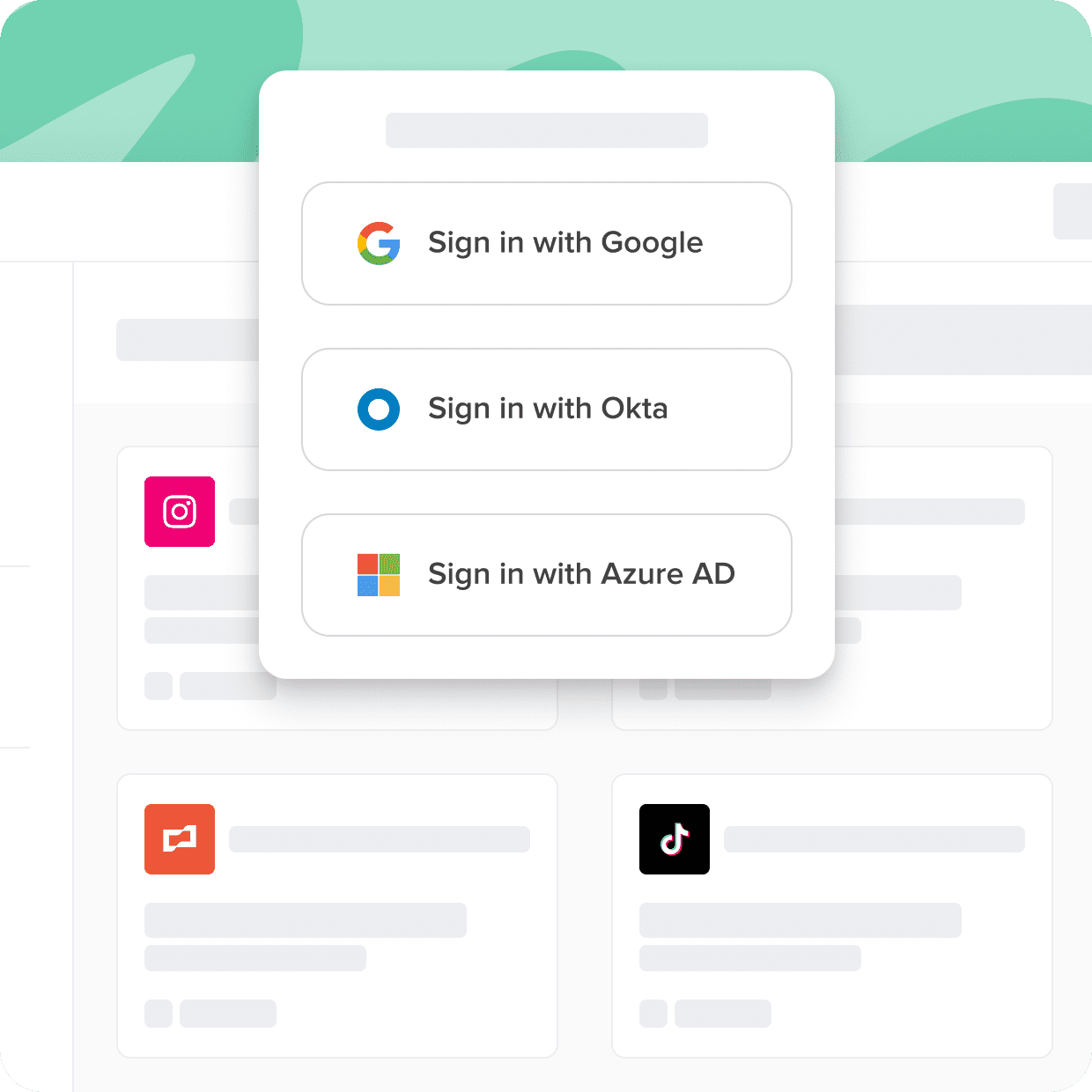Single Sign-On (SSO) solutions are technologies that allow users to access multiple applications and systems with just one set of credentials (username and password). SSO is a fantastic technology that allows businesses to eliminate password reuse and simplifies the login process.
Unfortunately, many corporate applications don't support the SSO standard and can't reap all the benefits. The applications that fall into this category are best called "nonfederated." Nonfederated applications are a new category that is becoming increasingly challenging for businesses to manage and secure effectively, yet increasingly critical for businesses to succeed.
Cerby connects all of your apps to your SSO tools, even if they don't support the SSO standard. In this guide, you'll learn about SSO software, the history, and the benefits.
Streamline Access With Single Sign-On
Not all apps are created equal. Some come with security gaps and complexities that can hinder user adoption and put sensitive data at risk. With Cerby, you can ensure secure and seamless access to all your applications, regardless of their support for standards like SSO.
With Cerby You Can

Close the identity gap

Universally enforce 2FA

Eliminate the SSO tax
SSO Solutions
Single sign-on (SSO) solutions are crucial for modern application development, as they offer a secure, efficient, and convenient way to manage user authentication and access. As highlighted in the Ponemon Institute study, the main benefit of SSO is that it permits a user to have one set of login credentials—for example, a username and password to access multiple applications. Thus, SSO eases the management of multiple credentials.
Improved user experience
Single sign-on solutions improve the user experience by eliminating the need for users to remember and enter multiple usernames and passwords for each application or service they use. This streamlines the process and makes it more convenient for users. As a result, SSO can reduce the burden on IT departments by decreasing help desk support requests related to forgotten passwords. It can also improve overall security by eliminating weak combinations of usernames and passwords used across multiple services.
Centralized System
SSO also provides businesses with a centralized system that makes it easy to manage user access rights across their entire suite of applications and services. This makes it easier and more secure to control user access rights in a single location, rather than trying to manage them separately for each application or service.
SSO solutions are essential for modern application development as they provide several benefits. These include improved user experience, increased security, and better access control management. Implementing SSO solutions can benefit businesses across all industries since they are easy to use, more secure, and offer greater flexibility in managing user access rights.
SSO Services
Single sign-on authentication is a highly secure form of technology that allows users to access multiple applications with one SSO login. It is becoming popular among businesses as it provides an easy way for customers and partners to access their necessary applications in the most efficient way. In order to take advantage of security benefits while meeting user needs, businesses must carefully consider their specific SSO requirements before implementing any solution.
When asking what SSO is and its solutions, there are several key factors that need to be taken into account to evaluate your choices.
Security
To ensure a secure implementation of SSO services, organizations should prioritize authentication methods that require additional user credentials, such as two-factor authentication (2FA) or multi-factor authentication (MFA). It is equally important to consistently use encryption protocols to protect any data transmitted or stored by the system from potential security threats.
Compliance
To choose the right SSO solution, it is important to consider compliance with regulations related to data security and privacy. Organizations should ensure that the solution they select follows all applicable laws. Businesses should conduct thorough research to determine their specific requirements before selecting a service provider. This is because requirements can vary depending on the industry or location. It is also important to ensure that the chosen service provider has a proven track record of success in this area and has earned relevant certifications that demonstrate compliance with various standards and regulations.
SSO Providers
When it comes to choosing the best SSO providers and solutions to cater to your business needs, there are a few key features you should consider. SSO is an authentication system that allows users to access multiple applications with just one set of credentials and offers organizations improved security, better user management, and increased productivity.
The ideal SSO provider should provide secure SSO for all the company’s applications by using strong authentication methods, such as two-factor authentication or biometrics. Additionally, it should offer powerful identity management capabilities so that administrators can effectively manage user accounts and ensure secure access control throughout the organization.
Some of the features to consider while comparing different SSO providers and solutions include:
- Support for a variety of authentication methods, such as two-factor authentication, biometrics, and more.
- Ability to integrate with existing applications and systems within your organization.
- Comprehensive identity management capabilities that allow administrators to manage user accounts easily and securely.
- Ability to customize the solution to meet specific business needs by using APIs or SDKs.
- Compatibility with various operating systems (iOS, Android, Windows, etc.), web browsers (Chrome, Safari, Firefox), and mobile devices (smartphones and tablets).
- Automated provisioning that allows users access without creating separate accounts for each application.
- Comprehensive user access control features that allow administrators to easily manage user access and permissions.
- Support for SSO across devices, allowing users to securely log in from any device.
- Security features such as data encryption, audit logging, and multi-factor authentication.
- Scalability that allows the SSO solution to grow with your organization’s needs.
- Some SSO providers offer different pricing models depending on the number of users or other criteria, making it important to understand the cost of the solution before committing to a provider.
By considering these essential features when looking at different SSO solutions and providers, you can be sure to choose the right one for your business needs.
Identity Provider Examples
You must be careful when selecting an identity provider for SSO, meaning it's important to consider which provider best suits your requirements. There are numerous providers to choose from, each with distinct features and abilities. Here are an identity providers list that you may want to explore.
Auth0
Auth0 is a cloud-based platform providing secure authentication solutions. It allows users to log in easily by using their current login credentials, including social media logins and traditional username/password combinations. This makes it a versatile choice suitable for any organization. Additionally, Auth0 offers increased security features including two-factor authentication (2FA) and device fingerprinting to enhance security.
Okta
Customers seeking efficient identity and access management often choose Okta. This solution includes multiple authentication protocols (SAML, OpenID Connect, and OAuth 2.0) and offers additional security through multi-factor options like push notifications and biometric scanning in combination with traditional passwords.
Microsoft Azure Active Directory
Microsoft Azure Active Directory (AD) is another popular identity provider example. It allows organizations to quickly deploy an SSO solution across multiple applications while also providing additional features such as automated user provisioning and directory synchronization. This makes it highly scalable and suitable for enterprise deployments where managing multiple applications and users can be challenging.
Free Options
There are some free SSO providers that offer basic identity management capabilities. These include Google Apps, OneLogin, and Ping Identity, all of which provide a simple way for organizations to quickly deploy an SSO solution without spending money on extra infrastructure or software licenses. Of course, these services may not offer the same security features as paid options, but they can still provide an adequate basis for most small-scale deployments.
SSO Portal
The SSO Portal makes it easier for businesses to access their accounts, applications, and services. By using this portal, users only need to log in once to securely access everything instead of remembering multiple logins and passwords. In addition, the SSO Portal uses website encryption during authentication to prevent phishing attempts.
The SSO Portal is a new technology that allows users to access different applications, accounts, and services using only one secure login instead of multiple ones. It has powerful authentication and encryption features that ensure protection against phishing attacks by hackers.
Using the SSO Portal allows users to manage multiple accounts more efficiently, enhance security, and streamline their workflow. The expenses for implementing the SSO Portal will vary based on the number of services and accounts required by your business. You should assess the costs of implementing the SSO Portal and compare them with the potential benefits to determine if it is beneficial for your business.
Using the SSO Portal can offer various advantages including enhanced user experience, heightened security, minimized IT support expenses, and improved compliance with regulations. It can also lower the frequency of re-authentication requests and diminish the need for managing credentials manually.
SSO Tools
To choose the most suitable SaaS SSO solution for your organization, it is crucial to evaluate different providers to assist you in selecting the right tool.
Some of the most popular tools that are involved in SSO solution comparisons include these options:
- Microsoft Azure AD Premium
- Google G Suite Enterprise Edition
- Okta Identity Cloud
- Auth0 Universal Login
- OneLogin Access Management
Each provider offers different features and levels of scalability, depending on their pricing plans and capabilities.
Open-source options are also available for those looking for cost-effective solutions. These can include free versions of software like OpenSSO or Keycloak, as well as paid versions such as ForgeRock Identity Platform or WSO2 Identity Server.
When selecting an SSO tool, it is important to consider both short-term and long-term needs. Short-term needs may include the cost of implementation and maintenance and any specialized features your organization requires. Long-term needs should focus on scalability and flexibility so that the solution can adapt to future changes in technology, business processes, user expectations, or other needs.
Other factors to consider when selecting an SSO tool are:
- User experience
- Data security and privacy compliance requirements
- Application integration capabilities
- Ease of deployment and administration
- Customer service availability
- Vendor reputation
Contact Cerby today to learn more about our access management platform and how we can help you select an SSO tool that meets your needs. Our team of experts is available to discuss your organization’s requirements, answer any questions, and help you create an individualized access management strategy. Don’t wait — start streamlining user authentication and improving security with Cerby today!

